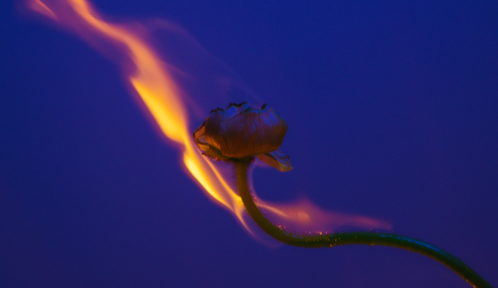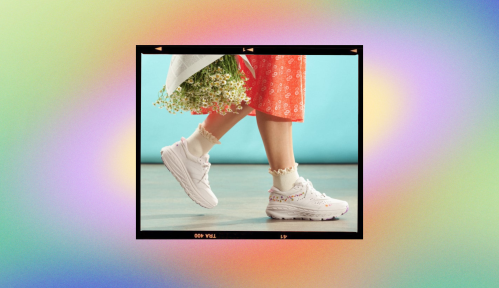Our editors independently select these products. Making a purchase through our links may earn Well+Good a commission
There are many reasons why you’d feel a burning sensation “down there” without having an infection. Maybe you’ve held your pee a little too long at work (PSA to give yourself regular bathroom breaks!), you didn’t change out of your sweaty leggings fast enough post-workout, or you haven’t sipped water in a while. When you finally do pee, the relief is real. But if the burning sensation comes back again, what else could it be? Do you have a UTI after all? Sure, UTIs are the most common cause, but it’s totally possible to have a burning sensation after urinating but no infection.
Experts in This Article
a urogynecologist with UTHealth Houston
a professor of urology at the University of Iowa
“UTIs are the most common cause and usually the first thing we want to rule out,” says Karl J. Kreder, MD, MBA, a professor of urology at the University of Iowa. A UTI (urinary tract infection) is a bacterial infection that can cause dysuria—i.e., a burning or itching sensation when urinating. UTIs can often be detected with at-home test kits and a urine culture at your doctor’s office.
But if you’ve ruled out an infection, it’s not a dead end. There are several other health conditions that could be the culprit. Read on to learn the most common causes of post-pee burning, symptoms to look out for, and when to see a doc about your discomfort.
9 causes of a burning sensation after urinating
The reasons for burning post urination range from mild to more severe. Here are the top causes.
1. You have interstitial cystitis (aka, painful bladder syndrome)
Interstitial cystitis (IC)—commonly referred to as painful bladder syndrome—can cause painful urination without infection. This pain can feel like burning, stabbing, or an aching, heavy feeling in your pelvic floor. Other symptoms include the following, per the Mayo Clinic:
- Chronic pelvic pain
- A persistent, urgent need to urinate
- Frequent urination (often in small amounts) throughout the day and night
- Pain or discomfort when your bladder fills
IC can worsen when you’re on your period or after intercourse, but the exact cause of the condition is largely unknown. Doctors suspect, though, that it’s connected to inflammation, autoimmune reactions, or genetics, per the Mayo Clinic.
“Interstitial cystitis can be accompanied by wider spread pain throughout the body,” adds Dr. Kreder. He says it’s a diagnosis of exclusion, meaning a doctor will test for other causes and if everything is negative, you may get an IC diagnosis.
How to treat it
The first line of treatment for IC is lifestyle changes like drinking more water, eliminating foods or beverages (like coffee) that trigger flare-ups, and reducing stress. Your doctor may also refer you to a pelvic floor therapist to help strengthen your pelvic floor muscles. In severe cases, your doctor can prescribe an oral overactive bladder (OAB) medication to relieve urinary discomfort, per the National Library of Medicine (NLM).
2. It’s a pregnancy side effect
If you get urinary tract irritation when you’re pregnant or postpartum, it’s most likely due to a UTI, according to Stanford Health. But that’s not the only potential reason. It could also be due to skin irritation or inflammation in the urethra—from hormone changes during pregnancy, says Apurva Pancholy, MD, a urogynecologist with UTHealth Houston.
How to treat it
If you’re pregnant (or recently had a baby) and feel even slight burning after urination, reach out to your doctor, says Dr. Pancholy. They can help you figure out the cause, and decide on the proper treatment plan.
3. You have bladder or kidney stones
A post-void burning sensation that’s sharp or intense can be from bladder or kidney stones. Bladder stones are hard clumps of minerals found in the bladder, often caused by a small amount of urine remaining in the bladder after peeing, per the Cleveland Clinic. Kidney stones, on the other hand, are hard clumps found throughout your urinary tract, which typically form from too many minerals and too little liquid in your pee, per the Cleveland Clinic.
Typically, a burning sensation happens right before you pass a kidney or bladder stone, says Dr. Kreder. Other symptoms he mentions include the following:
- Pain in your lower abdomen, back, or flank (sides)
- Vaginal or testicle pain
- Blood in urine
- Nausea
- Chills
- Fever
How to treat it
While it can be extremely painful, most bladder or kidney stones pass through the urinary tract on their own—without medical intervention. If you think you’re passing a stone, drink plenty of water and reach out to your doctor to run blood or urine tests. These tests may help prevent future stones and doctors may also provide medication or assistance to help your current stone pass more easily.
4. You’re in menopause
Menopause is often a time where noninfectious urinary symptoms tend to pop up. During this life transition, your estrogen levels drop. This decrease can cause inflammation or irritation of the urethra, says Dr. Pancholy. Researchers have named this condition genitourinary syndrome of menopause (GSM), per April 2020 research in Cureus1. While symptoms can vary, many people feel a burning sensation during or after peeing and vaginal dryness.
How to treat it
“A lot of times, this can be treated with topical estrogen,” says Dr. Kreder. Other options include nonhormonal lubricants, selective estrogen receptor modulators (SERMs), or other hormone therapies. If you’re transitioning to menopause (or you’re already in it), don’t be afraid to let your doctor know about your menopause symptoms, so you can get proper treatment.
5. You have urethral stricture disease
If you’re a person with a penis, urethral burning after peeing could be from something called urethral stricture disease. This condition causes your urethra to narrow, which can slow the stream of pee from your bladder and lead to pain or burning when you pee. Other symptoms can include the following, per Mount Sinai:
- Feeling like you have to urinate right after a trip to the bathroom
- Frequent or urgent need to urinate
- Pelvic or urethral pain
- Bleeding
- Over time, recurrent UTIs or kidney damage
How to treat it
Other than closely monitoring your symptoms and relieving pain with medication, there are a few different procedures that can be done to help with urethral stricture. This includes urethral dilation (a procedure where the urethra is widened or stretched) or internal urethrotomy (where it is widened by cutting out scar tissue). If both don’t offer relief, you may need a surgery to reconstruct your urethra.
6. It’s urethritis
Urethritis—or an inflammation of the urethra—usually occurs due to an infection, according to the Cleveland Clinic. There are a few different types, per the Cleveland Clinic:
- Gonococcal urethritis—this form is caused by gonorrhea
- Nongonococcal urethritis (NGU)—this variety results from another sexually transmitted infection (STI), such as chlamydia, but it can also be due to urethra irritation or urinary tract infections
- Non-specific urethritis (NSU)—with this form, the exact cause is unknown
While urethritis is often due to an STI, that’s not always the case. Like UTIs, some of the causes of NGU are having a catheter in place, an inflamed prostate, or a tightened foreskin per the American Sexual Health Association (ASHA). Urethritis symptoms include pain while peeing or during sexual intercourse, as well as itchiness and pelvic pain, according to the Cleveland Clinic. If you have a penis, another symptom is penile discharge.
How to treat it
Antibiotics are the most common form of treatment for urethritis, per the Cleveland Clinic. In some cases, lifestyle adjustments may be helpful too. For example, if using a certain soap or other product led to urethritis, you’ll want to avoid it going forward, according to the Cleveland Clinic.
7. You have pelvic inflammatory disease
If this uncomfortable feeling after peeing is accompanied by other symptoms like fever or unusual vaginal discharge, pelvic inflammatory disease (PID) may be to blame. This infection is often the result of an untreated STI—usually chlamydia or gonorrhea, per the CDC. Other common symptoms to look out for include the following, per the CDC:
- Pain or bleeding during sex
- A bad odor from your vagina
- Bleeding between periods
Treating PID as soon as possible is important because, even after treatment, PID may lead to fertility issues. In fact, according to the CDC, 1 in 8 women with a history of PID have difficulty getting pregnant.
How to treat it
Treating PID often comes down to treating the underlying STI or infection. To figure out which STI you’re dealing with, your doctor can perform an STI test and prescribe the proper antibiotic, per the CDC.
8. It’s from an STI
“Any infection of the urinary tract can cause a burning sensation when urinating, and that includes STIs,” says Dr. Kreder. The STIs most likely to cause urinary discomfort after peeing are chlamydia or gonorrhea, but there are others that can cause similar symptoms. Other signs of STIs often include the following, per the Mayo Clinic:
- Pelvic pain
- Sores on your genital, oral, or rectal area
- Unusual discharge from your vagina or penis
- Unusual vaginal bleeding
- Pain during sex
- Fever
- Widespread rash
In order to figure out which STI you’re dealing with, your doctor can run an STI screening or a series of blood or urine tests, per the Mayo Clinic.
How to treat it
After getting tested, your doctor can figure out the right treatment plan for you. This will often include taking antibiotics to treat your infection and abstaining from sex to stop the spread of disease.
9. In rare cases, it can be bladder cancer
Bladder cancer is not as common, but its early warning signs often include noninfectious urinary tract symptoms. You may find blood in your urine, have the urge to urinate more often, get back pain, or get a burning sensation after you pee, per the Mayo Clinic. In late stages, it can also cause pain in your pelvis or other bones or joints.
How to treat it
Bladder cancer is diagnosed through a series of tests like a cystoscopy (where a small camera is inserted into your bladder to view the tissue), a biopsy, and urine samples, per the Mayo Clinic. Treatment typically involves rounds of radiation or chemotherapy and sometimes surgery to remove the bladder.
How to stop a burning sensation after urinating
“Believe it or not, changes in diet are often the first line of treatment,” especially if you have IC, says Dr. Pancholy. He says common foods that can trigger urinary discomfort include:
- Spicy food
- Acidic food (like tomatoes or citrus)
- Alcohol
- Caffeine
- Artificial sweeteners
Along with diet adjustments, Dr. Pancholy says it’s important to drink plenty of water throughout the day, avoid holding in pee for too long, and relax your pelvic muscles when peeing. Keeping up with your personal hygiene (that is, washing “down there” regularly) and preventing infection is also important.
And because your symptoms could be related to a much bigger health issue, Dr. Pancholy recommends reaching out to your doctor. They can prescribe any necessary medications or refer you to a specialist—like a urologist, gynecologist, or even a pelvic floor therapist.
Dr. Kreder says if you’re going to try the pelvic floor therapy route, it’s important not to try pelvic floor exercises on your own just yet (i.e., without a therapist’s guidance). Not all the exercises you find online will eliminate that burning sensation before, during, or after peeing; a professional’s help is recommended.
When to see a doctor
“If burning with urination is a transient thing that happened once last week, I don’t want anybody to get scared about it,” says Dr. Pancholy. But “if it’s something that’s happening frequently, then it’s time to get evaluated because there are treatments available,” he adds. A primary-care doctor, gynecologist, or urologist should be able to figure out the underlying cause and refer you to the proper specialist.
You should especially reach out to your doctor if your burning sensation is accompanied by other red flags like blood in your urine, fever, or severe pain, he adds.
The bottom line? A frequent burning sensation “down there” doesn’t always mean UTI, but your doctor can help you figure out the cause. “There’s not one medication that treats every case,” says Dr. Kreder. “A doctor will create a diagnosis based on a patient’s history, physical examination, a urine culture, and sometimes other tests.”
FAQ
How long does it take for burning pee to go away?
The exact length depends on the cause. In some cases, burning pee can go away on its own in a few days, especially if you’re drinking water, peeing regularly, and keeping up with your personal hygiene. Other times, it may last longer and require medical attention. If your burning is consistent or worsening (whether it’s after you pee or not), it’s best to let your doctor know.
What medication stops burning pee?
There are a few different over-the-counter (OTC) and prescription medication options that can relieve a burning sensation when you pee. For example, AZO (an OTC analgesic), can help relieve urinary pain and burning. NSAIDs (like Ibuprofen or acetaminophen) can also help temporarily relieve pain. But if the burning is from an infection, a prescription antibiotic is the only effective treatment. (FYI, you can still use at-home UTI remedies like applying heat alongside meds, too!)
What foods are for optimal bladder health?
A little-known bladder fact is that certain foods can actually help (or irritate) it. The best foods for bladder health include fruits and veggies with a high water content, such as peaches, papaya, cauliflower, and kale. High-fiber foods, including whole grains, legumes, and potatoes, are also good options.
—reviewed by Jennifer Logan, MD, MPH
Angelou, Kyveli et al. “The Genitourinary Syndrome of Menopause: An Overview of the Recent Data.” Cureus vol. 12,4 e7586. 8 Apr. 2020, doi:10.7759/cureus.7586
↩︎
Sign Up for Our Daily Newsletter
Get all the latest in wellness, trends, food, fitness, beauty, and more delivered right to your inbox.
Got it, you've been added to our email list.











